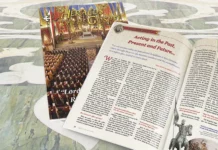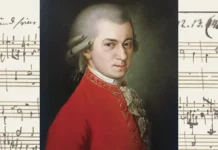Just like a garden, the spiritual life requires continual care, for defects can spring up in the most hidden recesses and in the most unexpected ways, choking the flowers and fruits of virtue that God wants to cultivate within us.
One of the most famous mottos of ancient philosophy is certainly “know thyself”. This phrase attributed to Socrates, Athenian philosopher, brings to mind a generally overlooked truth: the importance of always considering ourselves according to our true worth.
A fact that occurred in the life of Dr. Plinio Corrêa de Oliveira may help us to better understand this principle.
What distinguishes a free man from a criminal?
From a very young age, Dr. Plinio stood out for his talent as an orator, and was often called to speak in the most varied settings. On one occasion he was invited to give a lecture in preparation for Easter Communion in Carandiru, a former prison in the city of São Paulo – a rather unusual experience for a member of the high society of São Paulo, accustomed to the social life of aristocratic circles.

At the prison’s entrance, one of the directors warned him about the inherent dangers of the premises and recommended vigilance. But the young speaker entered, especially attracted by the opportunity the occasion presented to apply his aptitude for psychological analysis. And what was his surprise when he observed that the physiognomies he encountered behind bars were more like those of the people he saw every day circulating in the streets than he had imagined…

inmates from the 1930s
He discerned, at the same time, that the general public differed from the prisoners in a specific point, which during the speech came to his mind as an unequivocal conclusion: from time to time over the course of their lives, free individuals examined their conscience, albeit discreetly and imperfectly; those in prison, in contrast, had never analysed themselves in this way, which led them to fall into the crimes for which they were now being justly punished.
According to Dr. Plinio’s own comparison, faults are like a load of gunpowder that accumulates in our souls: those who never scrutinize themselves run the risk of accumulating such a quantity of this dangerous substance that a small spark can detonate an unimaginable disaster.
Excellent means of spiritual progress
Some might object that exercises of piety and spiritual development, such as the examination of conscience, or even the Sacraments, sound anachronistic today. However, such a judgement is most likely born of a faulty understanding of these salutary practices.
In the words of a certain Jesuit priest, “to ward off death, we eat every day; to recover from fatigue, we sleep. This double remedy is very old! Are you going to dispense with it on the pretext that it is outdated?”1 Now, if we have at our disposal excellent means, of undisputed efficacy, for making progress in the supernatural life, why should we not make use of them?
The human soul: with what should it be compared?
Those who think that our soul is like a vehicle that only needs a tune-up once in a while are greatly deceived… On the contrary, the spiritual life is like a garden that requires continuous care, for defects may spring up in the most hidden recesses and in the most unexpected ways.
Those who have ever dedicated themselves to horticulture are very familiar with a certain type of plant that is generally detested: the weed. Especially in a tropical country like Brazil, whose extremely fertile soil seems to always yield more than expected, these “enemy” plants spread with amazing speed!
We can draw a great analogy between this natural reality and the human soul. If we are not careful, vices choke the flowers and fruits of virtue and leave our souls looking like the “field of a sluggard” described in the Book of Proverbs: “I passed by the field of a sluggard, by the vineyard of a man without sense; and lo, it was all overgrown with thorns; the ground was covered with nettles, and its stone wall was broken down. Then I saw and considered it; I looked and received instruction. A little sleep, a little slumber, a little folding of the hands to rest, and poverty will come upon you like a robber, and want like an armed man” (24:30-34).

In the face of this implacable reality, we have the examination of conscience at our disposal, an aid which, if practised well – not just weekly or monthly, but daily – can achieve great and excellent results. A few minutes a day are enough to profitably examine our conscience.
The general examination of conscience
In his book Practice of Perfection and Christian Virtues – a work which, in the words of St. Anthony Mary Claret, has led more souls to Heaven than the stars that twinkle in the firmament2 – Fr. Alphonsus Rodriguez of the Society of Jesus offers us a superb treatise on the examination of conscience, with teachings of an eminently Ignatian character.3 Among them is the distinction between the general and the particular examen.
The general examen deals with all the actions of a given day or period of time. This is the one we make before sacramental Confession. It comprises five points or parts. When we recollect ourselves to make this examen, in the first place we give thanks to God for the benefits we have received, which is a very effective way to contrast Our Lord’s goodness and generosity with our own wickedness and indolence.
Then we ask Him to help us to know our faults and sins. Dr. Plinio used an interesting example to highlight the importance of analysing ourselves accurately: No surgeon in the world would ever dare to perform an operation in the dark. When we examine our conscience, we are the surgeons and the patients at the same time. That is why we must ask, not only at this moment but continually, for the grace to be enlightened so as to know ourselves well: “Lord, that I may see” (Lk 18:41). For how can we correct faults that we do not perceive or only perceive poorly?
The third step consists in considering the faults committed since the last Confession, and the fourth in asking God Our Lord to pardon our faults, as we are filled with sorrow for them and repent of them. We can go over the Commandments or the evangelical counsels with the help of a list outlining the faults against them, identifying where we have fallen and offended God. Finally, we make the resolution to sin no more, with the help of divine grace, and we end with a short prayer – an Our Father or a Hail Mary, for example.
Hierarchy of values
It should be emphasized that the full force of this examination lies in the last two points: sincere repentance and the decision to sin no more. From these we derive the most precious fruits of perfection that this habit can bring to our soul and, it should be said in passing, they are two indispensable requirements for the Sacrament of Confession.
The purpose of the general examen, as Fr. Garrigou-Lagrange maintains,4 does not lie principally in a complete and exhaustive enumeration of venial faults, but in seeing and sincerely accusing the principle from which they stem in us. In this regard, Dr. Plinio states: “A good examination of conscience must include not only the sinful acts, but the tendencies which lead us to commit those acts. For it is necessary to cut the root of the evil, so that evil does not happen.”5
Fr. Alphonsus Rodriguez6 explains – and here we refer once again to the figures of the plant kingdom – that if we pull up the bad herb by its roots, then the whole plant withers and dries up. But if we prune only the stalks and leave the roots in the earth, it will soon push up new stems and grow again.
The particular examination
On the other hand, it can also be said that the broader the the vista that meets our eyes, the less accurate will be our view of the details. For this reason, St. Ignatius of Loyola laid more importance on what is called the particular examen than on the general, because it enables us to deal with our faults one by one and thus overcome them more easily. Moreover, by tackling one vice, we combat them all.
When the people of Israel were challenged by enemy nations, God encouraged them by saying: “You shall not be in dread of them; for the Lord your God is in the midst of you, a great and terrible God. The Lord your God will clear away these nations before you little by little; you may not make an end of them at once” […] (Dt 7:21-22). Something similar applies to the imperfections of our soul. God wants us to fight hard against our defects, but He warns us that we will be more successful if we attack specific enemies and persevere in the fight against them until we defeat them completely: “I pursued my enemies and overtook them; and did not turn back till they were consumed. I thrust them through, so that they were not able to rise; they fell under my feet” (Ps 18:37-38).
The method of action

We proceed in our particular examen with the same method as in the general examination. According to the advice of Fr. Alphonsus Rodriguez,7 when choosing the point to be dealt with, we should begin with the exterior faults which trouble and disedify our neighbour, even if there are other greater interior faults, because reason and charity demand that we begin with what can cause harm to others, and live in such a way that they have no grievances against us. But the battle against external faults should not last a lifetime: they are easier to overcome, so we must rid ourselves of them as soon as possible in order to begin the fight against interior imperfections.
With these, the ideal method is to take the virtue we believe we most need to cultivate – which presupposes a contrary vice to combat – and break it down into specific points that will be easy to analyse. It would be a mistake to make a resolution like: “I will be humble in everything, and I will eradicate pride from my soul.” Although this is a very good desire, such a resolution involves a great number of attitudes and dispositions and it would be of little spiritual benefit to undertake something so generic. It would be much better to choose points such as: “I will not say anything that will result in self-praise” or “I will cut off at the outset any vain and haughty thought concerning my personal honour,” which are concrete resolutions, the fulfilment or non-observance of which is easily perceived.
How long should the struggle against one point last?
We know that the passions are inherent in human nature, and it is impossible to eradicate them completely. If we waited until we ceased to feel the impetus of a given passion – like anger or envy, for example – we would never move on to another subject for examination.
Our struggle against a vice should continue until it is weakened and we are able to refrain it with promptness and ease.
We shall then see with how much profit and benefit a few minutes of our day will be employed, and how easy the examination of our own internal and external actions will become.
The examination of conscience is an excellent means of perfecting ourselves as human beings and above all as children of God, for as a famous treatise writer says: “if we do not know ourselves, it is morally impossible to attain perfection.”8
A truly courageous person is one who knows how to face his shortcomings, his failings and his inability to practise virtue without the help of grace, and not try to hide them from God or himself. Such a person will succeed in reaching sanctity. ◊
Notes
1 HOORNAERT, Georges. O combate da pureza. São Caetano do Sul: Santa Cruz, 2021, p.177.
2 Cf. MOLINA, SJ, Rodrigo. Prólogo. In: RODRÍGUEZ, SJ, Alonso. Ejercicio de perfección y virtudes cristianas. Madrid: Testimonio, 1985, p.6.
3 It is worth noting that Fr. Alphonsus’ reflections, although addressed to persons in the religious life, are applicable to all those who tread the ways of sanctity, which is part of every state of life (cf. CCC 2013).
4 Cf. GARRIGOU-LAGRANGE, Réginald. As três idades da vida interior. São Paulo: Cultor de Livros, 2018, t.I, p.371.
5 CORRÊA DE OLIVEIRA, Plinio. Conference. São Paulo, Mar. 11, 1992.
6 Cf. RODRÍGUEZ, SJ, Alonso. Exercícios de perfeição e virtudes cristãs. São Paulo: Cultor de Livros, 2017, t.I, p.403.
7 Idem, p.403-407.
8 TANQUEREY, Adolphe. Compêndio de Teologia Ascética e Mística. São Paulo: Cultor de Livros, 2017, p.250.







